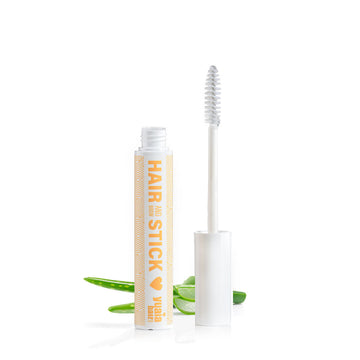Have you experienced that your scalp is just irritated and itchy? Don't worry, you are not the only one, many suffer with a sore and irritated scalp on a daily basis. An irritated scalp can have a big impact on your hair. It can be both painful and annoying, while at the same time preventing proper care of your hair. Here we have put together a guide on how to get rid of your irritated scalp as best as possible.

Sore and irritated scalp - Great guide on how to treat sore and irritated scalp

by Nanna Bundgaard | 01. February 2023 | Reading time: 9 minutes
Read more about the authorWhat characterizes a sore and irritated scalp?
Having a sore and irritated scalp can be quite uncomfortable and even painful. The characteristics of a sore and irritated scalp are that the scalp feels inflamed and tender when touched. The scalp may appear red and swollen with possible peeling or scaling of the skin. In some cases, bumps or blisters may form on the scalp due to irritation. In addition to physical changes, people with a sore and irritated scalp may experience itching, burning sensations, burning, tingling or throbbing in the head.
Why do I get a sore and irritated scalp?
If you experience a sore and irritated scalp, the most important step is to determine the cause. There are several factors that can affect an irritated scalp, including stress, an unbalanced diet and products that irritate the skin. It is also possible that an irritated scalp is due to an infection such as Seborrheic dermatitis or psoriasis. Finding the cause will not only facilitate treatment but also prevent future scalp problems.
Irritated and sore scalp due to dandruff
One of the main causes of a sore and irritated scalp can be dandruff, which is a condition that leads to itching, peeling and redness. It is caused by an overgrowth of fungi on the surface of the scalp, which then results in irritation and inflammation. Dandruff can be treated with anti-dandruff shampoo or medicated creams. If you want to know more about how to get rid of dandruff, you can read our blog post about dandruff right here .
Poor hair care can affect your scalp
Poor hair care such as chemical treatments, heat styling or tight hairstyles can irritate the scalp and make it prone to damage. Chemical treatments such as perming, bleaching and coloring can cause damage to the hair follicles and weaken the protective barrier around the scalp, which can lead to irritation. Heat styling tools should always be used with caution as they can cause dryness and breakage, which can lead to a sore and irritated scalp. Tight hairstyles such as braids or buns can also put too much tension on the scalp, which can lead to hair breakage or inflammation in the area.
Extensions
Extensions can cause a sore and irritated scalp because they pull on your natural hair, leading to tension and inflammation. Hair extensions are often attached using glue, which can contain harsh chemicals that irritate the delicate skin on the scalp. If extensions are not applied correctly, they can become tangled in the hair, pulling it and creating knots that are difficult to remove. Also, oils from the scalp can be blocked from reaching the hair shaft due to the use of extensions, which can lead to dryness or excessive greasiness in some areas. Finally, regular maintenance of extensions is necessary to prevent bacterial build-up, which can result in unpleasant scalp conditions such as itching and dandruff.
Psoriasis of the scalp
Scalp psoriasis is another common cause of irritated scalp. It is an autoimmune disease that causes scaling and irritation due to an overproduction of skin cells on the surface of the scalp. In some cases, it can result in itching, redness or even hair loss as a result of intense scratching or pulling of the affected areas to relieve discomfort from itching. Read more about scalp psoriasis here.
Allergies
Allergic reactions are another possible cause of a sore and irritated scalp due to contact dermatitis; it is when the skin becomes inflamed after coming into contact with certain substances such as chemicals in shampoo or fragrances in hair products to which you may be sensitive. To treat this type of reaction, one should first identify what caused it (usually using a patch test) and then avoid using products containing the substance in question.
Sore and irritated scalp and hair loss
A sore and irritated scalp can have a detrimental effect on the health and appearance of the hair. The hair follicles, which produce strands of hair, need a healthy environment to function optimally. When the scalp is sore and irritated, it disrupts the production process for the hair strand, which in some cases can help inhibit the hair growth cycle and thereby produce thin hair or end in hair loss. In addition, an unhealthy scalp tends to produce more oil than usual - this can make hair greasy and dull. It can also in some cases help to inhibit the hair's growth cycle and thereby produce thin hair or end in hair loss.
In addition, persistent scalp irritation often leads to itching and flaking - something that not only feels uncomfortable, but also affects the hairstyle. It often causes damage to the individual hair strands or tangling - both of which further damage the quality of the hair by, for example, causing split ends.
A sore and irritated scalp simply makes it difficult for healthy hair to grow, while the existing strands appear dull and lifeless. Therefore, it is very important to take proactive steps to restore the balance and well-being of the scalp as soon as possible.
How can I treat a sore and irritated scalp?
There are a number of measures you can take to treat and relieve a sore and irritated scalp. Try them out and see if something works for you.
Coconut oil
Coconut oil can be fantastic for giving the hair and scalp a lot of moisture and care. What you do is gently massage coconut oil into the scalp to relieve itching and soreness and reduce dryness. If you are interested in reading more about coconut oil and its effect on the scalp and hair, you can read our blog post about coconut oil for hair here.
Choose gentle hair care products
Use a mild shampoo when washing your hair, and avoid shampoos or styling products that contain harsh chemicals or alcohol, as these can further irritate the scalp. It is especially important to look for sulfate- and silicone-free shampoos or hair products. Sulfate in particular can contribute to worsening the condition of the scalp, it can even be the reason why your scalp is sore and irritated. In particular, you should look for the sulfates SLS and SLES, these are among some of the harshest sulfates that help dry out your scalp. You can read much more and sulfate- and silicone-free shampoo in our blog post here .
Turn down to wash the hair
Washing your hair less often can help relieve sore and irritated scalps because overwashing removes the natural oils that protect our scalps. Washing your hair too often can also damage the protective acid mantle of your scalp, leading to dryness, irritation and inflammation. Washing your hair just a few times a week with a mild shampoo can help restore the natural balance of the scalp's oil production while keeping dirt and product build-up at bay. It is also important to make sure that you rinse out all the shampoo after washing so that no residue remains. In addition, it is gentler on the scalp to use lukewarm water for both shampooing and rinsing than hot water.
Avoid heat styling the hair
If you have a sore and irritated scalp, it is often because it is dry. Therefore, you must avoid heat styling tools such as blow dryers, curling irons or straighteners, as these can cause excessive drying of the scalp and worsen the irritation. Instead, consider some heat-free alternatives such as the heatless curl method .
Avoid getting chemical treatments on your hair
Chemical treatments such as hair dyes and bleaches can be harmful to the scalp if done incorrectly or too often. When the scalp is already sore and irritated, it is even more vulnerable and susceptible to further damage. In such cases, it is best to avoid chemical treatments altogether.
Using certain chemicals on an irritated scalp can further worsen the condition. There can be a risk of infection due to scalp wounds. The chemicals used to dye or bleach hair are not only potentially irritating, but can also be harsh on sensitive skin because they contain strong alkalis that strip away protective oils from the surface of the scalp.
If you often get dyed or bleached hair, you can benefit from reading our blog post about bleaching hair here .
Use moisturizing products
It is important to use a moisturizing hair care product when you have a sore and itchy scalp. Moisturizing shampoos, conditioners and other hair care products are specially formulated to help moisturize the scalp and relieve irritation. The moisturizing ingredients in these products can help reduce the burning sensation caused by an itchy scalp. They also provide extra nourishment to the scalp's natural barrier so that it can better retain moisture and prevent further drying out.
To get the most out of moisturizing shampoos or conditioners, you should use them at least once or twice a week as part of your regular hair care routine. This will ensure that your scalp is adequately hydrated and has enough nutrients to stay healthy. If you have a particularly sensitive scalp, it may be beneficial to use a product specially formulated for sensitive skin, as they usually contain more moisturizing ingredients and fewer potential irritants.
If nothing works, contact the doctor
If you feel you have tried everything and all the good advice you have been given, but your scalp is still sore and irritated, it may be a good idea to contact your doctor or a dermatologist. They will often be able to guide you to products or possibly medicines that can help treat your scalp problems.
Get a 10% discount code sent to you
Receive the best tips and tricks for your hair from Lotte and Nanna 🥰
 2-4 day UK delivery
2-4 day UK delivery
 25.000+ satisfied customers
25.000+ satisfied customers
 Satisfaction Guarantee
Satisfaction Guarantee
























